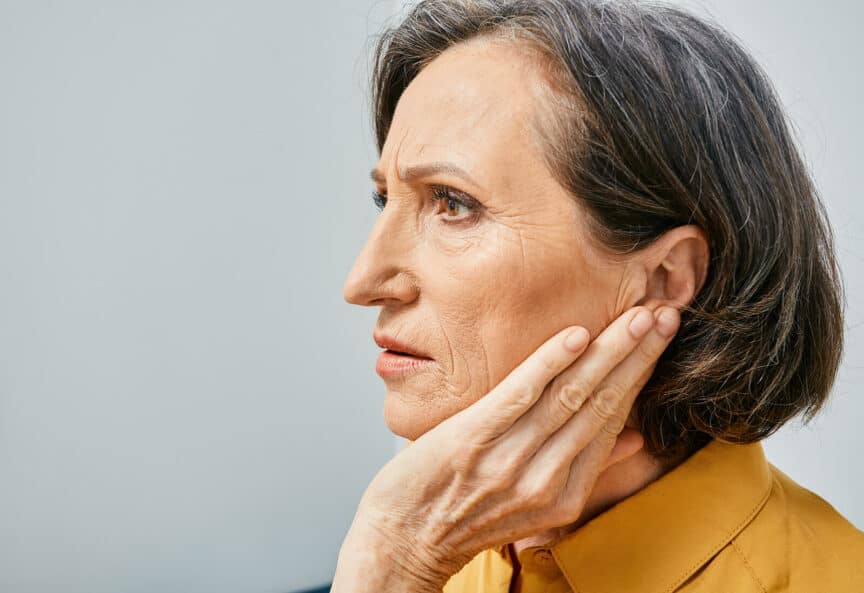Osteoporosis and hearing loss may seem like two unrelated health issues. Still, recent studies have shown a link between the two.
According to the National Osteoporosis Foundation, over 50 million Americans have Osteoporosis or low bone density, and 1 in 2 women and 1 in 4 men over 50 will break a bone due to Osteoporosis. The World Health Organization estimates that over 360 million people worldwide have disabling hearing loss, making it a significant public health issue.
What is Osteoporosis?
Osteoporosis is a condition in which the bones become weak, increasing the risk of fractures. It is a common condition affecting millions worldwide, particularly older adults. In people with Osteoporosis, the bones lose density and become thinner, making them more likely to break. Osteoporosis can affect any bone in the body, but it most commonly affects the bones in the hips, wrists, and spine.
Several factors can increase the risk of developing Osteoporosis, including being female, having a family history of the condition, being older, having a small and thin frame, and being postmenopausal. Other risk factors include low physical activity levels, smoking, and excessive alcohol consumption.
Studies show a link between Osteoporosis and hearing loss.
A study that followed nearly 144,000 women in the U.S. for up to 34 years found that Osteoporosis or low bone density was linked to up to a 30% higher risk of hearing loss that was moderate or worse.
Osteoporosis is a disease that makes bones less dense than they should be. This makes the bones weaker and more porous, which makes them more likely to break.
In the study, analysis was done on a total of 60,821 women from the Nurses’ Health Study (NHS) and 83,078 women from the Nurses’ Health Study II (NHS II). The NHS participants were followed for up to 34 years, from 1982 to 2016, and the NHS II participants were followed for up to 22 years, from 1995 to 2017. The study found that women with Osteoporosis or low bone density were more likely to have hearing loss that was moderate or worse.
A previous study supporting the link was done in 2018. Researchers looked at the records of 68,241 people with Osteoporosis who were at least 50 years old and used the Korean National Health Insurance Service. They found that people with the bone condition lost their hearing more quickly than those in the control group who didn’t have it. Even more people over 60 had Osteoporosis than those under 60.
Why is there a connection between osteoporosis and hearing loss?
The exact reason for the link between Osteoporosis and hearing loss has yet to be fully understood. Still, it could be that the tiny bones in the ear, called the ossicles, experience demineralization or the loss of minerals when someone has Osteoporosis.
The bones in the ear, also known as the ossicles, are three tiny bones involved in the hearing process. These bones are called the malleus, the incus, and the stapes.
These bones are essential to the hearing process. For instance, the stapes is the innermost ossicle connected to the incus on one end and the cochlea on the other. The stapes is the smallest bone in the body and is essential for hearing because it helps transmit the vibrations from the incus to the fluid-filled cochlea in the inner ear.
Together, these three bones help amplify the sound waves and transmit them to the inner ear, converting them into electrical signals sent to the brain for interpretation. The ossicles are essential for hearing, and any damage or demineralization of these bones can lead to hearing loss.
Regular hearing tests are recommended
More research is needed to fully understand the link between Osteoporosis and hearing loss. Still, the existing evidence suggests a connection between the two conditions. Regular hearing evaluations, especially for older adults with Osteoporosis, are essential for the early detection and treatment of hearing loss.
At our hearing practice, we understand the impact hearing loss can have on your daily life. That’s why we offer comprehensive hearing evaluations and treatment options to help improve your hearing and reconnect with the world around you.
If you’re an older adult with Osteoporosis or concerned about your hearing, we encourage you to schedule a consultation with our team. Our experienced audiologists will thoroughly evaluate and provide personalized recommendations to help you hear better.
Don’t let hearing loss keep you from enjoying life to the fullest. Contact us today to schedule your consultation and take the first step towards better hearing.

